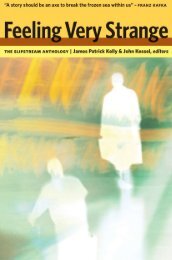The Curse of the Wer.. - Site de Thomas - Free
The Curse of the Wer.. - Site de Thomas - Free
The Curse of the Wer.. - Site de Thomas - Free
Create successful ePaper yourself
Turn your PDF publications into a flip-book with our unique Google optimized e-Paper software.
A MANIFESTO FOR WEREWOLVES<br />
<strong>of</strong> benevolent and transcen<strong>de</strong>nt organizing principles, its positive<br />
representation <strong>of</strong> hierarchical social organizations, and its simplistic<br />
polarization <strong>of</strong> ‘good’ and ‘bad’ appeared suspect. Despite <strong>the</strong> antimo<strong>de</strong>rnism<br />
<strong>of</strong> <strong>the</strong> new critical perspectives, fantasy was also seen<br />
as conservative on account <strong>of</strong> its own anti-mo<strong>de</strong>rnism — its frequent<br />
rejection <strong>of</strong> science and technology, its suggestion that ‘progress’<br />
really equals ‘<strong>de</strong>generation’ and its romanticization <strong>of</strong> a pastoral past. 19<br />
In<strong>de</strong>ed, <strong>the</strong> imagery <strong>of</strong> pastoral, pre-industrial, pre-mo<strong>de</strong>rn societies<br />
that prevails in fantasy suggests its in<strong>de</strong>btedness to romanticism; a<br />
connection that also worked against it at a time when many critics<br />
had come to associate romanticism with <strong>the</strong> politics <strong>of</strong> <strong>the</strong> far right<br />
(again, in spite <strong>of</strong> <strong>the</strong> fact that postmo<strong>de</strong>rnist <strong>the</strong>oretical perspectives<br />
owe a consi<strong>de</strong>rable <strong>de</strong>bt to <strong>the</strong> romantic tradition 20 ).<br />
As a consequence <strong>of</strong> critics’ discomfort, a ten<strong>de</strong>ncy to discuss ‘<strong>the</strong><br />
fantastic’ ra<strong>the</strong>r than ‘fantasy’ (<strong>of</strong>ten <strong>de</strong>spite a stated intention to<br />
examine ‘fantasy’) has characterized critical discussion since <strong>the</strong> 1970s.<br />
In such contexts, ‘<strong>the</strong> fantastic’ is <strong>de</strong>fined as an element <strong>of</strong> <strong>the</strong> supernatural<br />
or unreal which can be introduced into any text, and also as a<br />
‘mo<strong>de</strong>’ which transcends genre; both perspectives that enable a consi<strong>de</strong>ration<br />
<strong>of</strong> canonical or ‘literary’ fiction, thus absolving <strong>the</strong> critic from<br />
engaging with popular fantasy. 21 As Helen Merrick observes, fantasy<br />
in such usages ‘<strong>the</strong>n becomes just ano<strong>the</strong>r mo<strong>de</strong> used by mainstream<br />
authors, here figured as “anti-realist” and thus “postmo<strong>de</strong>rn”’. 22 One <strong>of</strong><br />
<strong>the</strong> primary sources <strong>of</strong> this approach is Rosemary Jackson’s influential<br />
study entitled Fantasy: <strong>The</strong> Literature <strong>of</strong> Subversion (1981), which used<br />
<strong>the</strong> terms ‘fantasy’ and ‘<strong>the</strong> fantastic’ interchangeably throughout, but<br />
did not consi<strong>de</strong>r works <strong>of</strong> popular fantasy by authors such as C.S. Lewis,<br />
J.R.R. Tolkien or Ursula Le Guin. Ra<strong>the</strong>r, Jackson was concerned with<br />
‘<strong>the</strong> way in which elements <strong>of</strong> fantasy enter into, disrupt and disturb’<br />
certain texts. 23 This focus ten<strong>de</strong>d to force a Gothic reading on to <strong>the</strong><br />
texts she examined, a bias that was reinforced by her stated preference<br />
for texts that ‘replace familiarity, comfort, das Heimlich, with<br />
estrangement, unease, <strong>the</strong> uncanny’. 24 Her focus on ‘subversion’ also<br />
skewed <strong>the</strong> focus away from popular fantasy, towards a postmo<strong>de</strong>rn<br />
literature that questions <strong>the</strong> ways in which reality and subjectivity have<br />
135





